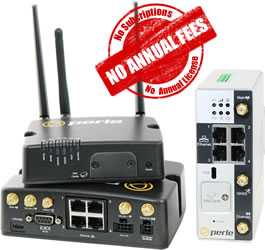
Enabling End-to-End Security in Cellular Routers for Industrial Applications
By Alex PirvulescuDirector of Product Management
September 10, 2025
A system breach can lead to operational disruptions, financial losses, and safety hazards for industrial businesses. End-to-end security reduces these risks by ensuring data integrity, confidentiality, and availability across the entire data transmission path.
Cellular router end-to-end security refers specifically to protecting data in transit from the point of origin to the destination. As the industrial sector seeks to protect itself from cyberattacks, companies understand the need for comprehensive end-to-end security measures, including zone-based policy firewalls and Multi-Factor Authentication (MFA), among others.
How Integrated Zone-Based Policy Firewalls Enhance End-to-End Network Security
Integrated zone-based policy firewalls segment networks into separate zones, each governed by its own security policies. These firewalls enforce security rules based on the traffic's origin and destination zones rather than just IP addresses — facilitating granular control of network traffic. In a manufacturing plant, for example, businesses can establish separate zones for production line control systems, administrative offices, and external communications — each with differing security protocols tailored to their specific operational requirements.
Zone-based policy firewalls often integrate additional security features beyond standard firewall functions and enhanced end-to-end security. For one, the application of Access Control Lists (ACLs) helps manage and enforce finely-tuned access rules. ACLs provide control over what actions are permissible in each zone — such as which types of network traffic can enter or exit — based on the user’s identity or the nature of the data packets. Their integration with zone-based policy firewalls helps ensure that network traffic adheres to strict access rules, mitigating the risk of unauthorized data flows between zones. Aside from reducing security risks, the granular controls of robust ACLs help organizations manage access permissions efficiently across diverse IT environments, maintain the integrity of their data, and meet their regulatory and compliance obligations.
The End-to-End Security Implications of Multi-Factor Authentication (MFA)
MFA requires those trying to access sensitive systems or data to provide multiple forms of verified identification. That way, even if one factor (like a password) is compromised, the additional layer of security provided by the second factor (such as a hardware token, a mobile push notification, or a biometric verification) reduces the risk of unauthorized access. Adopting MFA has become a standard practice that, according to Microsoft, blocks over 99.9 percent of account compromise attacks.
Port Security
Port security limits the number of devices that can connect to a network port based on their MAC addresses, ensuring that only pre-approved devices can gain access. Moreover, it detects and blocks unauthorized attempts, providing alerts and logging incidents for further analysis. This means that network administrators can quickly respond to potential security breaches and maintain tight control over device connectivity.
For example, port security is utilized at the network layer in a refinery to control access to the operational technology (OT) network. Here, network switches are configured to only allow connections from devices with pre-registered MAC addresses that correspond to specific roles within the network infrastructure, such as SCADA systems, HMI stations, and engineering workstations. That way, if an unauthorized device attempts to connect, the port automatically disables itself.
IEE 802.1x
IEEE 802.1x complements port security by requiring device authentication before network access is granted, using a centralized server (such as RADIUS) to verify credentials. It establishes a port-based network access control framework by leveraging the Extensible Authentication Protocol (EAP) over LAN (EAPOL) to mediate the authentication process between devices and the authentication server. This means that even if an unauthorized device bypasses physical security measures and connects to the network, it still cannot access sensitive resources without proper credentials.
For instance, in a remote oil drilling operation, IEEE 802.1x is used to secure cellular routers connecting field devices to centralized control systems. Each router requires devices to authenticate with the central RADIUS server before establishing a connection, ensuring that only authorized devices can transmit operational data.
Secure Management Sessions
By prioritizing secure communication protocols and access controls, organizations can enhance the overall security, compliance, and reliability of their network and system management operations. Examples of secure protocols include HTTPS, SSH, NIST-approved SSI/TLS ciphers, encryption and SNMPv3. Secure management sessions ensure the confidentiality, integrity, and availability of management activities, essential for safeguarding critical systems and data against unauthorized access, tampering, and eavesdropping. A key benefit of secure management sessions is that they enable safe remote administration of network devices, servers, and infrastructure components. This is particularly advantageous for organizations that operate across geographically dispersed environments, such as franchisors, government agencies, oil & gas drillers and service providers, and construction firms.
Password Strength Checking
While password strength checking may seem like a routine security measure, it remains a critical component of a robust authentication strategy. Password strength checking lessens the risk of password-based attacks, including credential stuffing, common vectors for unauthorized access.
Strong password policies and procedures ensure compliance with industry standards and regulations, helping organizations avoid penalties while maintaining a secure environment. Real-time feedback provided during password creation educates users on secure password practices, fostering better security habits. Such policies and procedures, when explicitly articulated and rigorously applied, demonstrate a commitment to security, reinforcing users’ confidence and trust in the platform’s – and organization’s – integrity.
End-to-End Security with Perle IRG Routers
MFA with integrated zone-based policy firewalls and a range of other features that enhance end-to-end security provide industrial businesses with the means necessary to combat the growing threat of cyberattacks. Real-time intrusion detection systems, detailed event logging for forensic analysis, and advanced encryption protocols such as AES 256-bit encryption to secure data traffic, among others, are other key security features of IRG Routers.
Perle routers have a one-off cost — no subscriptions. Learn more about Perle IRG Cellular Routers here.



